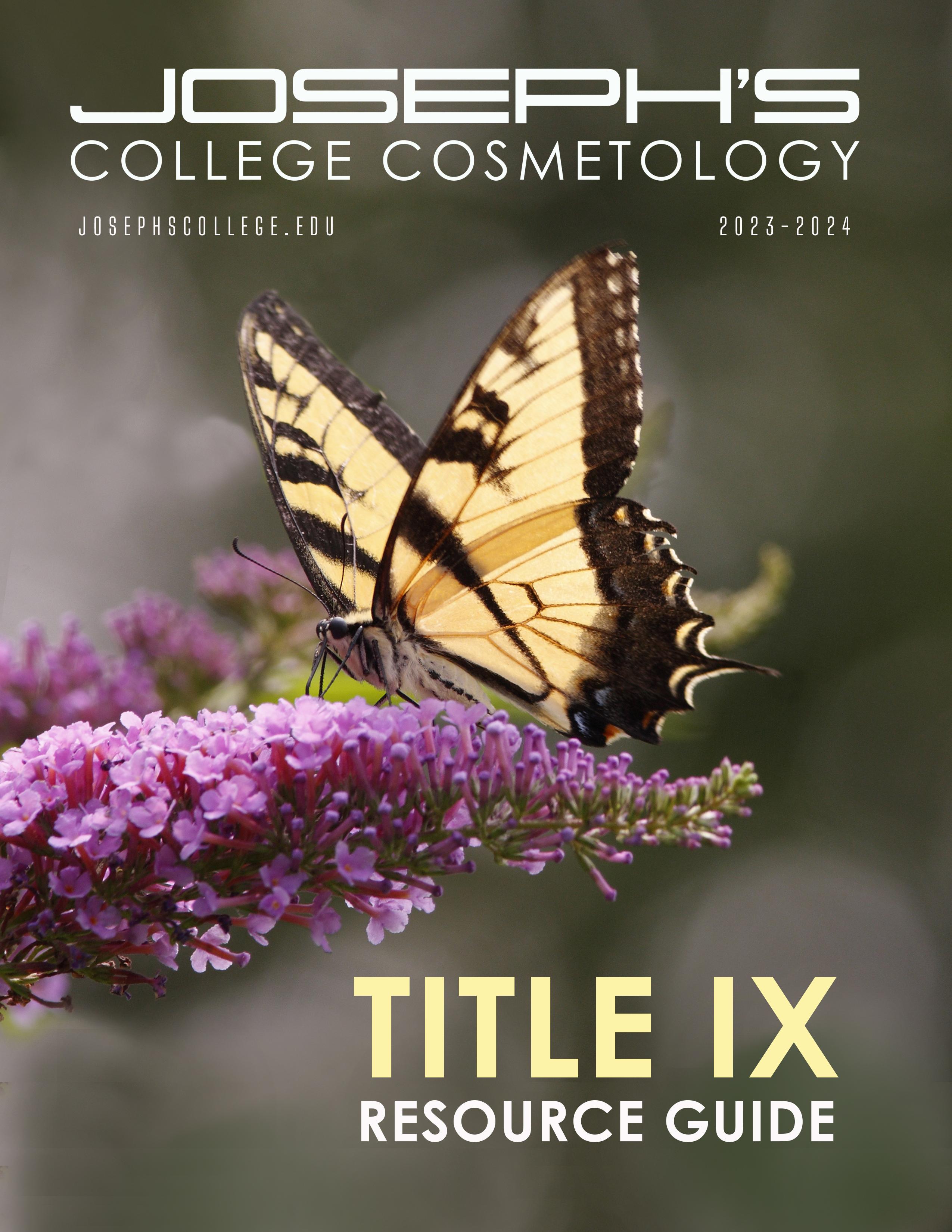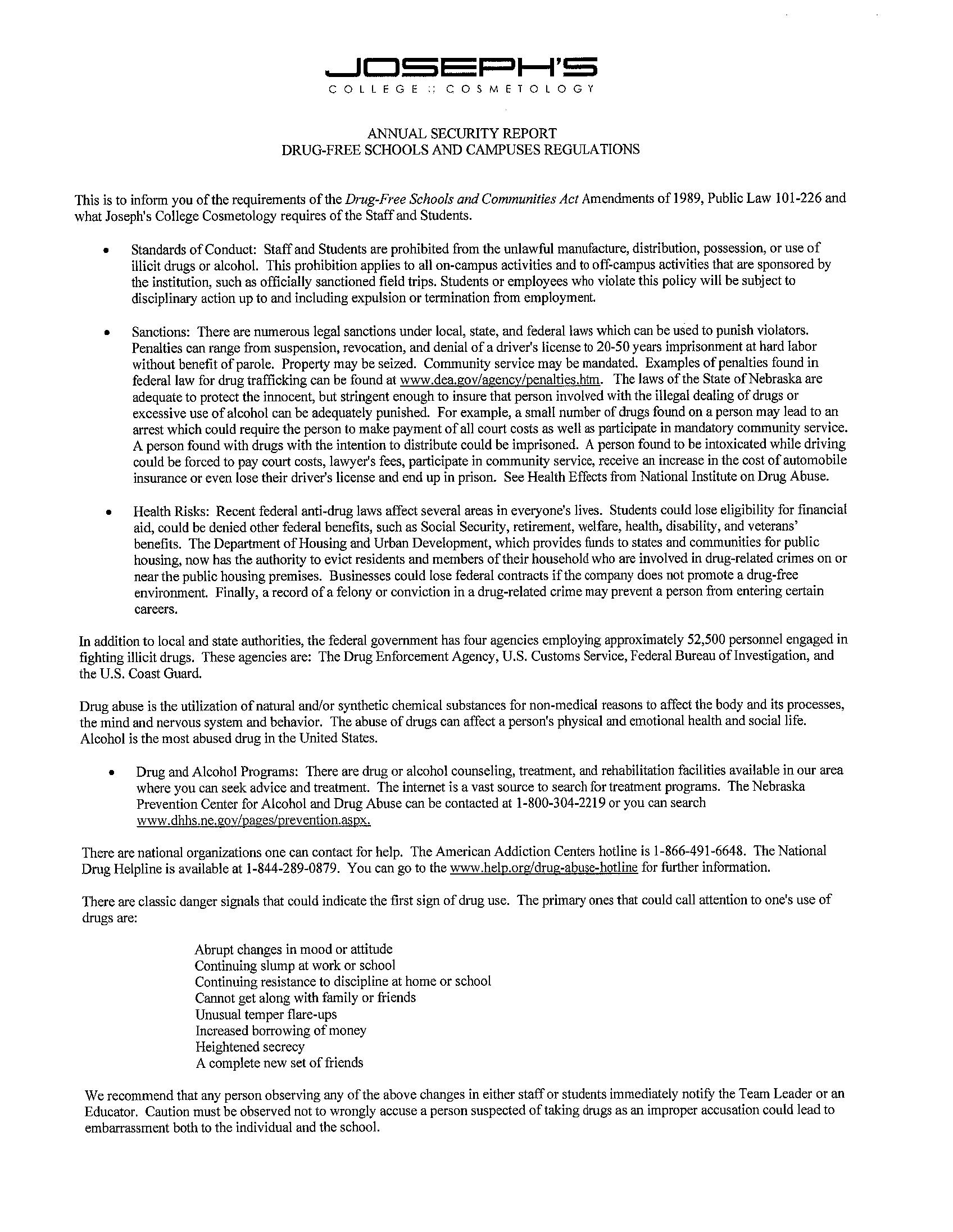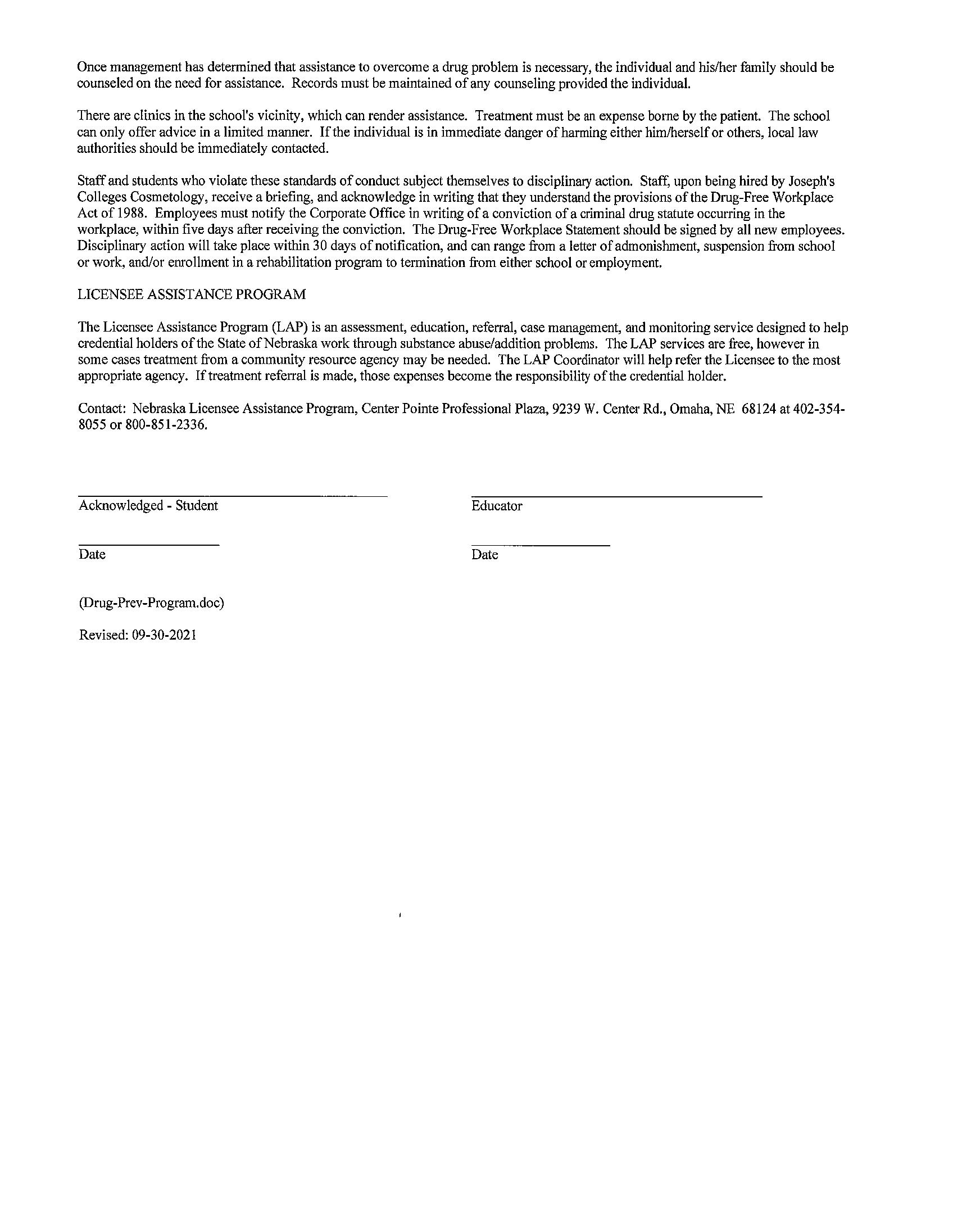

ANNUAL SECURITY REPORT
THE JEANNE CLERY DISCLOSURE OF CAMPUS SECURITY POLICY AND CAMPUS CRIME STATISTICS ACT
Commencing September 1, 1991, Joseph's College Cosmetology will collect information as required by Public Law 101-542. This information will be prepared, published and distributed to all current students and employees, and to any applicant for enrollment or employment upon request beginning September 1, 1992 and each year thereafter by October 1. Information will be collected for the period beginning January 1 through December 31 and each calendar year after.
Reporting Procedures
Should you need to report criminal actions or other emergencies occurring on campus and non-campus buildings or property *, please report this directly to the Team Leader or if not available to the instructor in charge. The Team Leader or Instructor will immediately notify the local police or sheriff department of any criminal action or emergency medical technicians depending on the seriousness of the incident. Joseph's College Cosmetology does not recognize any off-campus student organizations that would be covered by this act.
To ensure accurate and prompt reporting of all crimes, Joseph's College Cosmetology will take full written statements from parties involved and witnesses on all emergency or criminal incidents. The written statements are included as part of the written report and such statements may be used by Joseph's College Cosmetology staff and local/State law enforcement authorities for the purpose of apprehension and/or crime prevention. The Team Leader will then complete the "daily log "of reporting the record of all crimes reported to include: 1. the nature of the crime; 2. the date, time and general location, and 3. the disposition of the complaint (if known) for the Crime Awareness and Campus Security Form and submit to the corporate office within the week of occurrence and personally notify the Owner, Lydia J. Nims as soon after the occurrence as possible.
Depending upon the circumstances of the criminal action or emergency occurring on campus or a non-campus building or property the Team Leader will take appropriate actions to coordinate and facilitate the local police or sheriff departments and any assistance they might deem necessary. The purpose and authority of Joseph's College Cosmetology staff is limited to the enforcement of campus rules and regulations. Incidents that go beyond this scope are referred to and investigated by the local police or sheriff departments.
Joseph's College Cosmetology policies and procedures concerning security and access to campus facilities include the following: Joseph's Colleges Cosmetology campuses consist only of the building that the schooling and services are rendered in. The Norfolk campus does consist of buildings and parking lot. There are no other campus facilities such as dormitories, etc. at any of the Joseph's College Cosmetology or public property immediately adjacent to the campuses. The School Director maintains the Campus Security. They are responsible for opening and closing the school building. No outside security agency is used, as the campuses only consist of buildings. There is no other campus facilities that student’s access or would have to be maintained. There are no campus security personnel at Joseph's College Cosmetology. Joseph’s College Cosmetology does not have a policy of encouraging Pastoral or Professional Counseling.
The institution strictly prohibits the possession, use and sale of illegal drugs and strictly enforces Federal and State drug laws. The institution has a drug abuse program in effect, as required under sections 1213 of the HEA. For additional information on the institution's drug program please see the Team Leader or an Instructor and request a copy of the Drug Prevention Program
*Non-campus buildings or property includes:
* Any building or property (other than a branch campus) owned or controlled by an institution of higher education that is used in direct support of, or in relation to, the institution's educational purposes
* Is frequently used by students
* Is not within the same reasonably contiguous geographic area of the institution
CRIME STATISTICS
Monthly Crime Statistics data is collected from each location of Joseph’s College Cosmetology by the Team Leader and sent to the corporate office. See Crime Awareness and Security Form. Joseph’s College Cosmetology also annually contacts the local Police Departments to collect crime statistics for all Cleary Act crimes committed on or adjacent to each campus so that this information can be provided in the Annual Campus Crime Report.
School Access
The only people allowed in the school are Joseph's College Cosmetology staff, students and patrons. Joseph's College Cosmetology reserves the right to ask any visitor, student, staff or patron to leave the facility following any disruptive behavior.
Joseph's College Cosmetology provides a meeting of the local police or sheriff department at least annually to discuss with these students the procedures for crime prevention; how to prevent sex offenses, and the procedure to follow when sex offenses occur along with other safety related issues. Student and Staff are advised when exiting the school at night to leave in a group and to be aware of the surroundings. All School Directors provide information to all new classes as to school policy as to reporting crime or emergencies and encourage the students and employees to be responsible for their own security and the security of others.
New students and staff receive this Campus Report at Orientation and are advised at this point that they must be responsible for their own security and the security of others (staff).
Sexual Offenses
As mentioned under School Access, the institution has the local police or sheriff departments come out to the school at least annually. This group will discuss and promote the awareness of rape, acquaintance rape, and other forcible and non-forcible sex offenses.
Students are to follow the procedures detailed below if a sex offense occurs on campus:
1. Notify the Team Leader and the proper law enforcement authorities (police department). It is very important that the victim preserves evidence for the proof of a criminal offense.
2. Although Joseph's College Cosmetology has no on-campus housing, if requested, we will assist you in finding other living situations after an alleged sex offense.
3. The institution does not have any on-campus counseling centers but has, upon request, a listing of the centers and Mutual Aid Support Groups that victims of sexual offenses may contact for assistance.
Crime Statistics
Statistics will be gathered as to the occurrence On campus and Non-Campus buildings or property* of the following criminal offenses reported to the campus Team Leader or local police agencies:
a) Murder and Non-Negligent Manslaughter
b) Manslaughter by Negligence
c) Rape
d) Fondling
e) Incest
f) Statutory Rape
g) Robbery
h) Aggravated assault
i) Burglary
j) Motor vehicle theft
k) Arson
Hate Crimes are described as ones that manifest evidence of prejudice based on race, religion, sexual orientation or ethnicity, as prescribed by the Hate Crimes Statistics Act (28 U.S.C. 534).
a) Murder and Non-Negligent Manslaughter
b) Rape
c) Fondling
d) Incest
e) Statutory Rape
f) Robbery
g) Aggravated assault
h) Burglary
i) Motor vehicle theft
j) Arson
k) Larceny-theft
l) Simple assault
m) Intimidation
n) Destruction/Damage/Vandalism of property
In addition to the above crimes, the following statistics were gathered for these specific violations and report of the numbers of offenders.
a. Weapons: Carrying, Possessing, etc.
b. Drug abuse violations
c. Liquor law violations
Joseph's College Cosmetology policy regarding the possession, use, and sale of alcoholic beverages is that no students or employees shall possess, use or sell alcoholic beverages at any of the campuses of Joseph's College or at any school functions that are not on campus. Joseph's College Cosmetology have instituted the Drug Prevention Program that gives each student information regarding the possession, use, and sale of illegal drugs and enforcement of Federal and State drug laws and gives them a description of any drug or alcohol abuse education programs as required under Section 1213 of the Higher Education Act of 1965, as amended.
Violence Against Women Act of 1994
(42 U.S.C. 13925(a)
Joseph’s College Cosmetology policy regarding the incidence of Sexual Assault, Domestic Violence, Dating Violence, or Stalking is that students or employees shall make a good faith effort to comply with the statute of reporting these crimes. For these offences, such statistics shall be compiled in accordance with the definitions used in Section 40002(a) of the Violence Against Women Act of 1994 (42 U S.C. 13925(a)). Upon reports of these crimes, Joseph’s College Cosmetology Team Leader will notify the local law enforcement authority and the Lead Title IX Coordinator of any of the following occurring on campus or any non-campus building occurrence.
Definition: “Sexual Assault” is any offense that meets the definition of rape, fondling, incest, or statutory rape as used in the FBI’s UCR program. Any sexual act directed against another person, without the consent of the victim, including instances where the victim is incapable of giving consent.
• Rape - The penetration, no matter how slight, of the vagina or anus with any body part or object, or oral penetration by a sex organ of another person, without the consent of the victim.
• Fondling – The touching of the private body parts of another person for the purpose of sexual gratification, without the consent of the victim, including instances where the victim is incapable of giving consent because of his/her age or because of his/her temporary or permanent mental incapacity.
• Incest – Sexual intercourse between persons who are related to each other within the degrees wherein marriage is prohibited by law.
• Statutory Rape – Sexual intercourse with a person who is under the statutory age of consent.
Definition: “Domestic violence” means a “felony or misdemeanor crime of violence committed by -
• A current or former spouse or intimate partner of the victim,
• A person with whom the victim shares a child in common,
• A person who is cohabiting with or has cohabitated with the victim as a spouse or intimate partner,
• A person similarly situated to a spouse of the victim under the domestic or family violence laws of the jurisdiction receiving grant monies, or
• Any other person against an adult or youth victim who is protected from that person’s acts under the domestic or family violence laws of the jurisdiction.
Definition: “Dating violence” means “violence committed by a person –
• Who is or has been in a social relationship of romantic or intimate nature with the victim; and
• Where the existence of such a relationship shall be determined based on consideration of the following factors.
a. The length of the relationship.
b. The type of relationship; and
c. The frequency of interaction between the persons involved in the relationship.”
Definition: “Stalking” means “engaging in a course of conduct directed at a specific person that would cause a reasonable person to –
• Fear for his or her safety or the safety of others; or
• Suffer substantial emotional distress.”
For the purposes of this definition:
• Course of conduct means two or more acts, including, but not limited to, acts in which the stalker directly, indirectly, or through third parties, by any action, method, device, or means, follows, monitors, observes, survey’s, threatens, or communicates to or about a person, or interferes with a person’s property.
• Reasonable person means a reasonable person under similar circumstances and with similar identities to the victim.
• Substantial emotional distress means significant mental suffering or anguish that may, but does not necessarily, require medical or other professional treatment or counseling.
• Any incident meeting this definition is considered a crime for the purposes of Clery Act reporting.
Title IX of the Education Amendments of 1972 prohibits Joseph’s College Cosmetology discrimination based on sex to include conduct of a sexual nature or conduct referencing or aimed at a particular sex Includes sexual harassment (e.g., unwelcome sexual advances, requests for sexual favors), and sexual violence, which is a subset of sexual harassment (e.g., dating violence, domestic violence, sexual assault, or stalking).
Nor does Joseph’s College Cosmetology discriminate in its enrollment practices based on age, sex, race, ethnic origin, religion, gender, gender identity or color. Joseph’s College Cosmetology will identify, evaluate, and provide reasonable accommodations to students who are disabled within the meaning of Section 504 of the Rehabilitation Act of 1973. Shawna Arrigo, Vice President will serve as the coordinator of Section 504 activities.
Joseph’s College further has a policy that Sexual Harassment is not an acceptable behavior at any location. If a student feels that they are being sexually harassed, they should notify the Team Leader of the location they attend. The Team Leader will then notify the Title IX Coordinator and if necessary, the appropriate Local Police will be notified. Counseling can be found at the resources at the end of this report. The website for registered Sex Offenders for Nebraska is https://sor.nebraska.gov/ Under Title IX, obligations center around ensuring students are not discriminated against on basis of sex.
Title IX Coordinators:
Ken Broekemeier, Title IX Coordinator, 3516 So. 48th St., Lincoln, NE 68506, 402-475-5385 ext. 103 or ken@josephscollege.edu Title IX staff includes Rita Glenn, 3516 So. 48th St., Lincoln, NE 68506, 402-475-5385 ext. 104, rita@josephscollege.edu and Shawna Arrigo, 3516 So. 48th St., Lincoln, NE 68506, 402-475-5385 ext.102, shawna@josephscollege.edu. https://josephscollege.edu/Consumer-Information/Title-IX-Coordinator
Grievance Procedures
Any student or employee that has a complaint regarding sexual harassment should provide in writing their allegation to either the Title IX Coordinator or the Team Leader of the location they attend at. In response to a formal complaint of sexual harassment, Joseph’s College must follow a Title IX formal complaint process that complies with the new standards set forth in 34CFR 106.45.
Sexual harassment means conduct on the basis of sex that satisfies one or more of the following:
• Unwelcome conduct determined by a reasonable person to be so severe, pervasive, and objectively offensive that it effectively denies a person equal access to the school’s education program or activity.
• An employee of Joseph’s College conditioning the provision of an aid, benefit, or service of the school on an individual’s participation in unwelcome sexual conduct; or
• Sexual assault, as defined in the Cleary Act, or dating violence, domestic violence, or stalking as defined in VAWA.
Joseph’s College must respond to sexual harassment, with or without a formal complaint, when:
• The school has actual knowledge of the alleged sexual harassment.
• The alleged sexual harassment occurred in an education program or activity of the school; and
• The alleged sexual harassment was against a person physically located in the United States.
Actual Knowledge means notice of sexual harassment or allegations of sexual harassment to a school’s Title IX Coordinator or any official of the school who has authority to institute corrective measures on behalf of Joseph’s College.
• The mere ability or obligation to report sexual harassment or to inform a student about how to report sexual harassment, or having been trained to do so, does NOT qualify an individual as one who has authority to institute corrective measures on behalf of the institution.
The Title IX Coordinator must promptly contact the complainant to:
• Discuss the availability of supportive measures.
• Consider the complaints’ wishes with respect to supportive measures.
• Inform the complainant of the availability of supportive measures with or without the filing of a formal complaint; and
• Explain to the complainant the process of filing a formal complaint.
An education program or activity of the school includes “locations, events, or circumstances over which the school exercised substantial control over both the respondent and the context in which the sexual harassment occurs, and also includes any building owned or controlled by a student organization that is officially recognized by a postsecondary institution”.
Joseph’s College must respond “promptly” and “in a manner that is not deliberately indifferent.” The Joseph’s College Cosmetology Team Leader will complete the Daily Log-Crimes Reported form and submit it to the corporate office and the Lead Title IX Coordinator within 24 hours after the information becomes available after notifying the local law enforcement. It will be also indicated on the monthly Crime Awareness and Campus Security Form and will withhold the names of victims as confidential.
Joseph’s College response must treat complainants and respondents equitably by offering supportive measures to a complainant, and by following a compliant grievance process before the imposition of any disciplinary sanctions against a respondent.
Definitions:
Complainant: An individual who is alleged to be the victim of conduct that could constitute sexual harassment. Respondent: An individual who has been reported to be the perpetrator of conduct that could constitute sexual harassment. Consent: Joseph’s College is not required to adopt a definition of consent with respect to sexual assault.
Possible sanctions or protective measures that Joseph’s College Cosmetology may impose following a final determination of an occurrence of Sexual Harassment, i.e. domestic violence, dating violence, sexual assault, or stalking will be dismissal of said student from attendance.
Joseph’s College is permitted to remove a respondent from campus on an emergency basis, provided:
• That the school undertakes an individualized safety and risk analysis.
• Determines that an immediate threat to the physical health or safety of any student or other individual arising from the allegations of sexual harassment justifies removal; and
• Provides the respondent with notice and an opportunity to challenge the decision immediately following the removal.
Joseph’s College is also permitted to place a “non-student employee respondent” on administrative leave during the “pendency of (its) grievance process.”
The Title IX Coordinator is responsible for coordinating the effective implementation of supportive measures.
Supportive measures mean non-disciplinary, non-punitive individualized services offered as appropriate, as reasonably available, and without fee or charge to the complainant or the respondent before or after the filing of a formal complaint or where no formal complaint has been filed.
Such measures are designed to restore or preserve equal access to the school’s education program or activity without unreasonably burdening the other party, including measures designed to protect the safety of all parties or the school’s educational environment, or deter sexual harassment. The school must maintain as confidential any supportive measures provided to the complainant or respondent, to the extent that maintaining such confidentiality would not impair the ability of the school to provide the supportive measures.
Investigators must not have a conflict of interest or bias for or against complainants or respondents generally or an individual complainant or respondent. Investigators must objectively evaluate all relevant evidence-including both inculpatory and exculpatory evidence.
Investigators must create an investigative report that fairly summarizes relevant evidence. Evidence about the complainant’s sexual predisposition or prior sexual behavior is not relevant, unless:
• Such questions and evidence about the complainant’s prior sexual behavior are offered to prove that someone other than the respondent committed the conduct alleged by the complainant; or
• If the questions and evidence concern specific incidents of the complainant’s prior sexual behavior with respect to the respondent and are offered to prove consent.
Formal Complaint Procedures
A formal complaint of Title IX sexual harassment means a document filed by a complainant or signed by the Title IX Coordinator alleging sexual harassment against a respondent and requesting that the school investigate the allegation of sexual harassment. The phrase “document filed by a complainant” means a document or electronic submission that contains the complainant’s physical or digital signature, or otherwise indicates that the complainant is the person filing the formal complaint.
• A formal complaint may be filed with the Title IX Coordinator in person, by mail or by electronic mail and by any additional method designated by the school.
• At the time of filing a formal complaint, a complainant must be participating in or attempting to participate in the education program or activity of the school with which the formal complaint is filed.
State the standard of evidence to be used, whether that standard is the preponderance of the evidence or clear and convincing standards and apply the same standards of evidence for formal complaints against students as for formal complaints against employees, including faculty, and apply the same standard of evidence to all formal complaints of sexual harassment.
Upon receipt of a formal complaint, Joseph’s College must provide written notice to parties that includes:
• Formal complaint process, including any informal resolution option.
• Sufficient detail of the identities of the parties, if known, the conduct allegedly constituting sexual harassment, and the date and location of the alleged incident, if known.
• Statement that the respondent is presumed innocent and that a determination of responsibility is made at the conclusion of the process.
• Statement regarding the right to an advisor and to review and inspect evidence.
• Reminder that Joseph’s College prohibits knowingly making false statements or knowingly submitting false information.
All parties must be provided with sufficient time to prepare a response before any initial interview. Updated notice shall be given to respondents or complainant not included in the initial notice if the school decides to investigate allegations. Joseph’s College Cosmetology further will promote the primary prevention and awareness programs for all incoming students and new employees that include:
a. Joseph’s College Cosmetology prohibits the offences of domestic violence, dating violence, sexual assault and stalking on campus or any non-campus function
b. The definition of domestic violence, dating violence, sexual assault, and stalking in the applicable jurisdiction.
c. The definition of consent, in reference to sexual activity, in the applicable jurisdiction.
d. Safe and positive options for bystander intervention that may be carried out by an individual to prevent harm or intervene when there is a risk of domestic violence, dating violence, sexual assault, or stalking against a person other than such individual.
e. Information on risk reduction to recognize warning signs of abusive behavior and how to avoid potential attacks, and
f. Ongoing prevention and awareness campaigns for students and faculty, including information described in items a. through e.
Procedures victims should follow if a sex offence, domestic violence, dating violence, sexual assault or stalking are informing the Team Leader of the occurrence on campus or at a non-campus building during school functions is:
a. Reporting the occurrence to the Team Leader so that local law enforcement can be contacted.
b. Preserving any evidence as may be necessary to the proof of criminal domestic violence, dating violence, sexual assault, or stalking or in obtaining a protection order.
c. Be assisted by Team Leader in notifying law enforcement authorities if the victim chooses; and
d. Decline to notify such authorities; and
e. Where applicable, the rights of victims and Joseph’s College Cosmetology responsibilities regarding orders of protection, no contact orders, restraining orders, or similar lawful orders issued by as criminal, civil or tribal court.
Joseph’s College Cosmetology will do an investigation into the allegations provided by the complainant. Any witnesses named by the complainant or respondent will be interviewed to determine if there is relevant evidence. The interviewer will try to determine what evidence is relevant based on the elements of the offense. Specific questions based on known facts, documentary evidence and other interviews will be determined by the interviewer. Both complainants and respondents will be notified that there will be rules about appropriate conduct at the interview that require all participants to behave in an orderly manner. The interview will be terminated if an advisor or participant is not acting appropriately.
An Investigate Report summarizing the relevant evidence shall be provided to the decision-maker including but not limited to:
• The investigator shall not reach any conclusions.
• Put decision-maker in best position to understand relevant evidence.
• Demonstrate to parties that Joseph’s College Cosmetology took the allegation seriously and responded appropriately.
• Know that the report may be “Exhibit 1”.
Informal Resolution
Joseph’s College Cosmetology may not, under any circumstance, require a student or employee to waive the right to an investigation and adjudication of formal complaints under Title IX. Similarly, Joseph’s College Cosmetology may not require the parties to participate in the informal resolution of a formal complaint or even offer an informal resolution process unless a formal complaint is filed.
However, at any time prior to reaching a final determination, a school may facilitate an informal resolution that does not involve a full investigation and adjudication, if Joseph’s College Cosmetology:
• Provides the parties with a written notice disclosing (1) the allegations, (2) the requirements of the informal resolution process (3) the circumstances under which it precludes the parties from resuming a formal complaint arising from the same facts, and (3) any other consequences of participating in the informal resolution process, (4) the records that will be maintained or could be shared.
• Obtains the parties’ voluntary, written consent to the informal resolution.
An informal resolution is not available to resolve allegations that an employee sexually harassed a student. At any time prior to agreeing to a resolution, any party has the right to withdraw from the informal resolution and to resume the formal complaint process.
Procedures for Joseph’s College Cosmetology disciplinary action in cases of alleged domestic violence, dating violence, sexual assault, or stalking include:
a. Joseph’s College Cosmetology shall provide a prompt, fair and impartial investigation and resolution; and
b. Be conducted by Team Leader/Corporate officials to investigate and hearing process that protects the safety of victims and promotes accountability.
c. The accuser and the accused are entitled to the same opportunity to have others present during the disciplinary proceeding, including the opportunity to be accompanied to any related meeting or proceeding by an advisor of their choice; and
d. Both the accuser and the accused shall be simultaneously informed in writing of a. The outcome of any institutional disciplinary proceeding that arises from an allegation of domestic violence, dating violence, sexual assault, or stalking.
b. Joseph’s College Cosmetology procedures for the accused and the victim to appeal the results of the institutional disciplinary proceeding are:
c. Of any change to the results that occur prior to the time that such results become final; and
d. When such results become final.
Joseph’s College will dismiss a formal complaint of sexual harassment if, at any time:
• A complainant notifies the Title IX Coordinator in writing that he or she would like to withdraw.
• The respondent is no longer enrolled or employed by Joseph’s College; or
• Specific circumstances prevent the school from gathering sufficient evidence to reach a determination.
Upon a required or optional dismissal, schools must promptly and simultaneously send written notice to the parties.
Joseph’s College Cosmetology will protect the confidentiality of victims, including how publicly available recordkeeping will be accomplished without the inclusion of identifying information about the victim, to the extent permissible by law. Joseph’s College Cosmetology will provide written notification of students and employees about existing counseling, health, mental health, victim advocacy, legal assistance, and other services available for victims both on-campus and in the community.
Throughout the investigation, Joseph’s College must afford both parties an equal opportunity to review and inspect any evidence that:
• Was obtained as part of the investigation; and
• Is directly related to the allegations.
This includes evidence upon which the school does not intend to rely in reaching a determination, and inculpatory and exculpatory evidence, whether obtained from a party or other source. Generally, Joseph’s College must provide access early enough so that each party can meaningfully respond to the evidence prior to the conclusion of the investigation. Prior to issuing the investigative report, Joseph’s College must send parties all evidence subject to inspection and review and afford at least 10 days to submit a written response. Ten (10) days prior to hearing or other determination, Joseph’s College must send investigative reports to parties for review and written responses. At and during any hearing, Joseph’s College must make all evidence available to parties and afford equal opportunity to review, including purposes of cross examination.
Joseph’s College’s formal complaint process must not require, allow, rely upon, or otherwise use questions or evidence that constitute, or seek disclosure of, information protected under a legally recognized privilege, unless the person holding such privilege has waived the privilege.
Standard of Evidence
Joseph’s College will use preponderance of the evidence. Preponderance of the evidence means a particular fact or event was more likely than not to have occurred.
Appeal Processes & Standards
Appeals may be granted on the following basis:
• A procedural irregularity that affected the outcome.
• New evidence that was not reasonably available at the time determination or dismissal was made and could affect the outcome; and
• The Title IX Coordinator, investigator, or adjudicator had a conflict of interest or bias that affected the outcome of the matter.
Joseph’s College offers an appeal equally to both parties on an additional basis.
Supportive Measures
Joseph’s College must provide supportive measures by offering Counseling, mutual restrictions on contact between the parties, changes in school locations, and leave of absences.
Record Keeping
For each formal complaint of Title IX sexual harassment, Joseph’s College must maintain records for 7 years that include:
• Records of any actions, including any supportive measures, taken in response to a report or formal complaint of sexual harassment.
• The basis for Joseph’s College’s conclusion that its response was not deliberately indifferent.
• Documentation that the school took measures designed to restore or preserve equal access; and
• If the school did not provide supportive measures, the reasons why such a response was not clearly unreasonable in light of the known circumstances.
If there was an adjudication, the records also must contain:
• Any determination regarding responsibility.
• Any audio or audiovisual recording or transcript.
• Any disciplinary sanctions imposed on the respondent.
• Any remedies provided to the complainant.
• Any appeal and the result; and
• Any informal resolution and the result.
Apart from any specific proceeding, Joseph’s College must keep for 7 years, all materials used to train Title IX Coordinators, investigators, adjudicators, and any person who facilitates an informal resolution process. Joseph’s College must make these training materials publicly available on their websites. https://josephscollege.edu/Consumer-Information/Title-IX-Coordinator
Retaliation
This new rule specifically prohibits retaliation, providing that no school “or other person may intimidate, threaten, coerce, or discriminate against any individual for the purpose of interfering with any right or privilege secured by Title IX or this part, or because the individual has made a report or complaint, testified, assisted, or participated or refused to participate in any manner in an investigation, proceeding, or hearing under this part.”
Since Joseph’s College Cosmetology does not provide housing for its students, written notification regarding options for and available assistance in, changing academic, living, transportation and working situations, if so requested by the victim and if such accommodation is reasonably available regardless of whether the victim chooses to report the crime to local law enforcement would be up to the student involved.
A student or employee who reports to Joseph’s College Cosmetology that the student or employee has been a victim of domestic violence, dating violence, sexual assault, or stalking, whether the offense occurred on or off campus, shall be provided with this information explaining the student or employee’s rights and options.
Equitable Treatment
A Formal complaint process must treat complainants and respondents equitably. Remedies must be designed to restore or preserve equal access to the education program or activity. Joseph’s College’s formal complaint process requires an objective evaluation of all evidence and provides that credibility determinations may not be based on a person’s status as a complainant, respondent, or witness. The Objective evaluation includes:
• Impartial consideration of available evidence.
• No prejudgment of parties, witnesses, facts at issue, or how facts at issue are presented.
• No difference to recommendations of an investigator.
• Adjudicators may believe everything a party or witness says, part of it, or none of it.
Training of Key Participants is required by Title IX rules and regulations. All Title IX Coordinators, investigators, adjudicators, and any person who facilitates informal resolutions shall be trained in Title IX specifics to facilitate the complaints. This training is required every year.
Unfounded Crimes: Joseph’s College Cosmetology may withhold, or subsequently remove, a reported crime from its crime statistics in the rare situations where sworn or commissioned law enforcement personnel have fully investigated the reported crime and, based on the results of this full investigation and evidence, have made a formal determination that the crime report is false or baseless and therefore “unfounded”. Only sworn or commissioned law enforcement personnel may “unfound” a crime report for purposes of reporting under this section. The recovery of stolen property, the low value of stolen property, the refusal of the victim to cooperate with the prosecution, and the failure to make an arrest do not ”unfound” a crime report.
BASIC'S INTRODUCTION TO RULES AND REGULATONS
Statement: I have been introduced to, given a copy of, and understand the Rules and Regulations. The Course Outline for Joseph's College Cosmetology, the Satisfactory Progress Standards, the rules of Sanitation of the State of Nebraska, the Jeanne Clery Disclosure of Campus Security Policy and Campus Crime Statistics Act, Title IX Policies and Procedures and Joseph’s College Cosmetology Drug Prevention Program. I also understand that any deviation from any of these requirements should be regarded, as voluntary and corrective disciplinary measures will be taken.
Attending Instructor Signature
(CrimeAct.docx) Updated 08-14-2020
Victims are encouraged to contact these resources:
Rape, Abuse & Incest National Network 800-656-4673 www.rainn.org
National Suicide Prevention Lifeline 800-273-8255 www.suicidepreventionlifeline.org
National Child Support Abuse Hotline 800-422-4453 www.childhelp.org
National Domestic Violence Hotline 800-799-7233 www.ndvh.org
National Teen Dating Abuse Helpline 866-331-9474 www.Loveisrespect.org
ANNUAL SECURITY REPORT
GRAND ISLAND CAMPUS
JANUARY 1, 2025
Starting August 1, 1991, Joseph's College Cosmetology began collecting information with respect to campus crime and have established security policies. These crime statistics for the calendar years 2022, 2023 and 2024 are disclosed as follows: Number of Occurrences
Hate Crimes
Violence Against Women
Arrests and Referral for Disciplinary Action List # of Offenders (not # of Occurrences)
In addition to the statistics given above, I have been given a copy of the Crime Awareness and Campus Security Act of 1990 for Joseph's College Cosmetology.
(Right-G updated 01-01-2025)
KEARNEY
JANUARY 1, 2025
Starting August 1, 1991, Joseph's College Cosmetology began collecting information with respect to campus crime and have established security policies. These crime statistics for the calendar years 2022, 2023 and 2024 are disclosed as follows:
Number of Occurrences
Hate Crimes
Violence Against Women
Arrests and Referral for Disciplinary Action List # of Offenders (not # of Occurrences)
In addition to the statistics given above, I have been given a copy of the Crime Awareness and Campus Security Act of 1990 for Joseph's College Cosmetology
(Right-K updated 01-01-2025)
LINCOLN CAMPUS
JANUARY 1, 2025
Starting August 1, 1991, Joseph's College Cosmetology began collecting information with respect to campus crime and have established security policies. These crime statistics for the calendar years 2022, 2023 and 2024 are disclosed as follows: Number of Occurrences
Hate Crimes
Violence Against Women
Arrests and Referral for Disciplinary Action List # of Offenders (not # of Occurrences)
In addition to the statistics given above, I have been given a copy of the Crime Awareness and Campus Security Act of 1990 for Joseph's College Cosmetology
(Right-L updated 01-01-2025)
NORFOLK CAMPUS
JANUARY 1, 2025
Starting August 1, 1991, Joseph's College Cosmetology began collecting information with respect to campus crime and have established security policies. These crime statistics for the calendar years 2022, 2023 and 2024 are disclosed as follows:
Hate Crimes
Violence Against Women
Arrests and Referral for Disciplinary Action List # of Offenders (not # of Occurrences)
In addition to the statistics given above, I have been given a copy of the Crime Awareness and Campus Security Act of 1990 for Joseph's College Cosmetology
(Right-N updated 01-01-2025)

INTIMATE PARTNER VIOLENCE
- Intimate partner violence has been deemed one of the most pressing public health concerns affecting women of all ethnic, racial, and socioeconomic backgrounds.
- In contrast to other forms of violent victimization, intimate partner violence is remarkable for its serial and repetitive nature, with acts of actual or threatened violence often continuing after separation or divorce, at times ceasing only upon the death of one or both parties.
- Results of a large nationally representative survey of 8,000 adult women and 8,000 adult men underscore the fact that most violence against women is committed by current or former intimate partners or dates.
- The experiences of stalking and emotional abuse create a climate of unrelenting fear that haunts battered women even after they separate from their abusive partners.
- The severe physical violence perpetrated against many of these women by their partners serves to legitimize their fears that stalking behavior may escalate into more serious, life-threatening violence.











